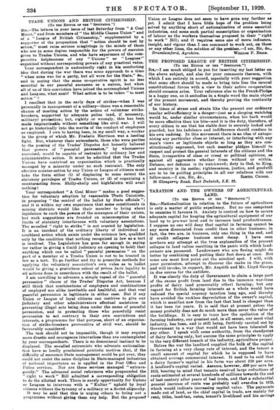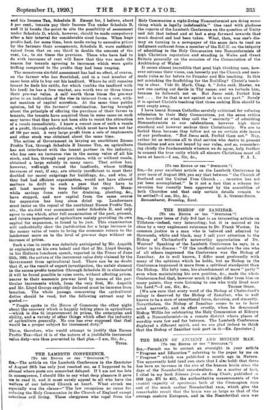TAXATION AND THE OWNERS OF AGRICULTURAL LAND.
[To THIS EDITOR OF THE " SPECTATOR."] Sne—Nationalization in relation to the future of agriculture is only a matter of public expediency. But no one competent to examine it favours it. Anxiety is centred on how to secure adequate capital for keeping the agricultural equipment of our land up to pre-war level and to increase land productiveness. I suppose no one will deny that capital in farming cannot be any more dissociated from credit than in other business; in fact, the two are, in business, only one thing in the end, and if credit collapses business must decay. I have seen nowhere any attempt at the true explanation of the present collapse in land values resulting in the panic with which land- owners are possessed. Landowners who are fleeing might do better by combining and putting their foot down at once. But some one must first point out the mischief spot. I will, with your permission, attempt to discover the snake in the grass, and will invoke, in support, Mr. Asquith and Mr. Lloyd George in due course for the antidote.
It was clearly the duty of Government to claim a large part of the excess profit from land due to the immense war-time profits of dairy (and presumably other) farming; but any regard for British farming interests as a whole would have reduced the special urgency taxation long ago, and thereby have avoided the reckless depreciation of the owner's capital, which is manifest now from the fact that land is cheaper than it has been for years. It is said that at present prices the money probably does not do much more than cover the value of the buildings. It is easy to trace how the spoliation of the farming industry, our greatest and, in all senses, our most vital industry, has been, and is still being, furtively carried out by Government in a way that would not have been tolerated in any other. I speak with some authority, from the standpoint of dairy farming only, but assume the same principles to apply to the very different branch of the industry, agriculture proper.
Before the war the landlord supplied the bulk of the capital in farming at a very cheap rate of interest, and the tenant a small amount of capital for which he is supposed to have obtained average commercial interest. It used to be said that a dairy farmer's capital in his farm was about £10 per acre. A landlord's capital varied. Assume, however, .250 per acre for 1913, bearing in mind that tenants received large reductions of rents estimated at several hundreds of millions towards the end of last century after years of bad trade, and that a substantial general increase of rents was probably well over-due in 1913, which would indicate increasing capital value. The payments made out of land, as the chief capital in trade, are mainly for rent, tithe, land-tax, rates, tenant's livelihood and his savings
and his Incense Taxi Schedule Except for, I believe, about
6 per cent., tenants pay their Income Tax under Schedule B, and it is beside the point-to cite the possibility of assessment under Schedule D, which, however, should be made compulsory after a fair interval for oonsiderable sized farms. When huge profits had, for some time, been made owing to excessive prices by the farmers their assegaments, Schedule B, were suddenly raised from that on one third to double the amount of the rent, i.e., to six times the previous. Those who have had to do with increases of rent will know that this was made the reason for tenants agreeing to increases which were quite trifling compared to the profits they had been reaping.
The monstrous, six-fold assessment has had no effect, of course, on the farmer who has flourished, and in a vast number of cases been able to buy out his landlord. Where he still remains tenant he finds his cattle, for which (unlike the landlord with his land) he has a free market, are worth two or three times their pre-war value. A calf worth three times the pre-war price is an indication of the rise in interest from a cow, with- out mention of capital accretion. At the seine time public opinion, led by the farmers' combination, having brought about the principle of offering the purchase of their farms to tenants, the tenants have acquired them in some cases on such easy terms that they have not been able to resist the attraction of a resale immediately. I know a recent case of such a resale at a profit, through sub-division, which must have been not far eff 100 per cent. A very large profit from a sale of implements and other stock was obtained about the same time.
The action of Government in levying an exorbitant Excess Profits Tax, through Schedule B Income Tax, on agriculture has not interfered with the tenant partner in the industry, who has seen an immense rise in the money value of all his stock, and has, through easy purchase, with or without resale, obtained a large subsidy in many cases. That action has, however, well-nigh ruined the landlords, whose trifling increases of rent, if any, are utterly insufficient to meet their doubled (or more) outgoings for buildings, &c., and who, if they had had efficient organization, would not have allowed matters to drift to such a pass that they have to sell land merely to keep buildings in repair. Mean- while savings from rents for draining, planting, &c., have stopped, and new capital from the same source for expansion has long since dried up. Landowners must insist on the repeal of the exorbitant Excess Profits Tax, viz., the six-fold war assessment under Schedule B, and only agree to one which, after full examination of the past, present, and future importance of agriculture mainly providing its own capital for expansion, is found to be just. This examination will undoubtedly show the justification for a large increase in the money value of rents to bring the economic return to the landowner more on to the level of pre-war days without an increase of prices..
Such a rise in. rents was definitely anticipated by Mr. Asquith in explaining on his own behalf and that of Mr. Lloyd George, in his Holborn luncheon speech, reported in the Times of June 25th, 1909, the nature of the increment value duty claimed by the Government from agricultural land. There can be no doubt that if, as the result of expert investigation, the unfair element in the excess profits taxation (through Schedule B) is eliminated it will be found possible to raise rents, without affecting prices,
nearer to their economic pre-war level by means of the par- ticular increments which, from the very first, Mr. Asquith and Mr. Lloyd George explicitly declared •must be immune from taxation. The whole passage concerning the agricultural duties should be amid, but the following extract may be quoted :-
" People spoke in the House of Commons the other night about the recovery which is happily taking place in agriculture —which is due to improvement in prices, the enterprise and ability, and a variety of other things which affect the industry of agriculture generally. No one has ever supposed that that would be a proper subject for increment duty."
Those, therefore, who would attempt to justify this Excess Profits Tax—that it is of the nature of a justifiable increment value duty—are thus prevented in that plea.—I am, Sir, &c., Turns.



































 Previous page
Previous page